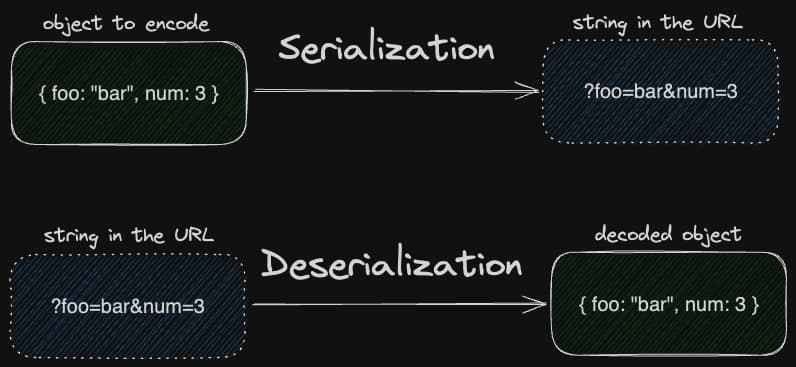Custom Search Param Serialization
By default, TanStack Router parses and serializes your URL Search Params automatically using JSON.stringify and JSON.parse. This process involves escaping and unescaping the search string, which is a common practice for URL search params, in addition to the serialization and deserialization of the search object.
For instance, using the default configuration, if you have the following search object:
const search = { page: 1, sort: 'asc', filters: { author: 'tanner', min_words: 800 },}It would be serialized and escaped into the following search string:
?page=1&sort=asc&filters=%7B%22author%22%3A%22tanner%22%2C%22min_words%22%3A800%7DWe can implement the default behavior with the following code:
import { createRouter, parseSearchWith, stringifySearchWith,} from '@tanstack/react-router'
const router = createRouter({ // ... parseSearch: parseSearchWith(JSON.parse), stringifySearch: stringifySearchWith(JSON.stringify),})However, this default behavior may not be suitable for all use cases. For example, you may want to use a different serialization format, such as base64 encoding, or you may want to use a purpose-built serialization/deserialization library, like query-string, JSURL2, or Zipson.
This can be achieved by providing your own serialization and deserialization functions to the parseSearch and stringifySearch options in the Router configuration. When doing this, you can utilize TanStack Router's built-in helper functions, parseSearchWith and stringifySearchWith, to simplify the process.
[!TIP] An important aspect of serialization and deserialization, is that you are able to get the same object back after deserialization. This is important because if the serialization and deserialization process is not done correctly, you may lose some information. For example, if you are using a library that does not support nested objects, you may lose the nested object when deserializing the search string.

Here are some examples of how you can customize the search param serialization in TanStack Router:
Using Base64
It's common to base64 encode your search params to achieve maximum compatibility across browsers and URL unfurlers, etc. This can be done with the following code:
import { Router, parseSearchWith, stringifySearchWith,} from '@tanstack/react-router'
const router = createRouter({ parseSearch: parseSearchWith((value) => JSON.parse(decodeFromBinary(value))), stringifySearch: stringifySearchWith((value) => encodeToBinary(JSON.stringify(value)), ),})
function decodeFromBinary(str: string): string { return decodeURIComponent( Array.prototype.map .call(atob(str), function (c) { return '%' + ('00' + c.charCodeAt(0).toString(16)).slice(-2) }) .join(''), )}
function encodeToBinary(str: string): string { return btoa( encodeURIComponent(str).replace(/%([0-9A-F]{2})/g, function (match, p1) { return String.fromCharCode(parseInt(p1, 16)) }), )}So, if we were to turn the previous object into a search string using this configuration, it would look like this:
?page=1&sort=asc&filters=eyJhdXRob3IiOiJ0YW5uZXIiLCJtaW5fd29yZHMiOjgwMH0%3DUsing the query-string library
The query-string library is a popular for being able to reliably parse and stringify query strings. You can use it to customize the serialization format of your search params. This can be done with the following code:
import { createRouter } from '@tanstack/react-router'import qs from 'query-string'
const router = createRouter({ // ... stringifySearch: stringifySearchWith((value) => qs.stringify(value, { // ...options }), ), parseSearch: parseSearchWith((value) => qs.parse(value, { // ...options }), ),})So, if we were to turn the previous object into a search string using this configuration, it would look like this:
?page=1&sort=asc&filters=author%3Dtanner%26min_words%3D800Using the JSURL2 library
JSURL2 is a non-standard library that can compress URLs while still maintaining readability. This can be done with the following code:
import { Router, parseSearchWith, stringifySearchWith,} from '@tanstack/react-router'import { parse, stringify } from 'jsurl2'
const router = createRouter({ // ... parseSearch: parseSearchWith(parse), stringifySearch: stringifySearchWith(stringify),})So, if we were to turn the previous object into a search string using this configuration, it would look like this:
?page=1&sort=asc&filters=(author~tanner~min*_words~800)~Using the Zipson library
Zipson is a very user-friendly and performant JSON compression library (both in runtime performance and the resulting compression performance). To compress your search params with it (which requires escaping/unescaping and base64 encoding/decoding them as well), you can use the following code:
import { Router, parseSearchWith, stringifySearchWith,} from '@tanstack/react-router'import { stringify, parse } from 'zipson'
const router = createRouter({ parseSearch: parseSearchWith((value) => parse(decodeFromBinary(value))), stringifySearch: stringifySearchWith((value) => encodeToBinary(stringify(value)), ),})
function decodeFromBinary(str: string): string { return decodeURIComponent( Array.prototype.map .call(atob(str), function (c) { return '%' + ('00' + c.charCodeAt(0).toString(16)).slice(-2) }) .join(''), )}
function encodeToBinary(str: string): string { return btoa( encodeURIComponent(str).replace(/%([0-9A-F]{2})/g, function (match, p1) { return String.fromCharCode(parseInt(p1, 16)) }), )}So, if we were to turn the previous object into a search string using this configuration, it would look like this:
?page=1&sort=asc&filters=JTdCJUMyJUE4YXV0aG9yJUMyJUE4JUMyJUE4dGFubmVyJUMyJUE4JUMyJUE4bWluX3dvcmRzJUMyJUE4JUMyJUEyQ3UlN0Q%3DSafe Binary Encoding/Decoding
In the browser, the atob and btoa functions are not guaranteed to work properly with non-UTF8 characters. We recommend using these encoding/decoding utilities instead:
To encode from a string to a binary string:
export function encodeToBinary(str: string): string { return btoa( encodeURIComponent(str).replace(/%([0-9A-F]{2})/g, function (match, p1) { return String.fromCharCode(parseInt(p1, 16)) }), )}To decode from a binary string to a string:
export function decodeFromBinary(str: string): string { return decodeURIComponent( Array.prototype.map .call(atob(str), function (c) { return '%' + ('00' + c.charCodeAt(0).toString(16)).slice(-2) }) .join(''), )}Subscribe to Bytes
Your weekly dose of JavaScript news. Delivered every Monday to over 100,000 devs, for free.
